Four decades ensuring safety of electrical appliances with Derek Johns
Electrical engineer Derek Johns is one of our longest running standards development committee members having joined his first committee looking at standards for the safety of electrically-operated farm appliances in 1984.

Derek Johns, Long-time committee member and electrical engineer
Since then the world of standards has shifted massively. "This has reflected in the content and iterations of standards over the decades", says Derek. "Over the past 10 years alone we’ve seen growing focus on the Internet of Things, need for cyber security across devices and equipment, and shift from fossil fuels to renewables."
Appliances now exist in a connected world
"With more and more appliances being connected to networks, standards have a role to play in protections being integrated into software and hardware, so users’ appliances and information are not hacked and they work as they should do" says Derek, reminding us of our growing dependence on smart technology. "These days you need to have a broad view and awareness of multiple areas where standards are integrated. For example, as we replace equipment in our homes and workplaces with smart equipment the spotlight is going to be on software and chip technology, and electricians, electrical engineers, designers and those revising standards will need to have a broader understanding around the technology available. New Zealand has a lot of competence in this area and while we don’t necessarily write the software used in appliances, we do participate in laying down the rules to be embedded in standards, that the software, and appliances, need to meet".
Built by experts
As a recipient of the Officer of the New Zealand Order of Merit 2015, amongst other awards, Derek has been recognised for contributing his high level of technical knowledge to regional and international standards development, through joint Australian/New Zealand committees, and IEC (International Electrotechnical Commission) committees.
Derek runs his own electrical consultancy business in Christchurch, specialising in safety, electromagnetic compatibility and power quality related to electrical appliances and high-voltage equipment design and certification. A Canterbury graduate, Derek gained a Masters in Nottingham, UK, becoming a Fellow of the Institution of Engineering and Technology (London) and a Chartered Engineer. On his return home his career saw him spend time working with many of New Zealand’s leading electrical appliance companies including Fisher & Paykel Appliances, Sunbeam, Gallagher Group, TruTest, and PDL/Schneider Electric.
Give back and grow
"Over the years these companies supported me with time to sit on committees, as they understood the value towards professional development of the investment of time. This is something I would strongly encourage in nominating organisations and employers of those wishing to join development committees. We need to welcome new blood who will take the standards forward and can give back and grow since somebody has to do it."
"Some people question the time commitment. Much of it depends on the specific standard and how many committees you get involved with, but it can lead to life changing experiences. I’ve met peers and presented seminars all over the world including in Australia, Canada, Bahrain, Saudi Arabia, Singapore, Vietnam, China, Korea, and Italy. In building international networks through being on working groups, and building a reputation, you may often be the person people turn to for opinions, or it may open doors to new opportunities."
"In 2014 I was asked to join a foreign expert programme where experts spend time in other countries sharing knowledge from agriculture, nuclear, aerospace and many other sectors and industries. What initially started as a six month stint in China representing on appliance safety and technology, became a seven year commitment with up to three times a year visits up to 2019, when I stopped going because of the pandemic. However, for the past three years the move was to more online, utilising video conferencing technology."
"Standards development can be very rewarding. I’ve worked with very bright young engineers who needed help in how to approach and gain exposure to international markets and standards help remove ambiguity or interpretation, setting the requirements for international trade. Much of my time in China was spent in Guangzhou where businesses collectively are one of the largest users in the world of the IEC 60335 series on the safety of household and similar electrical appliances."
60335 series covers many appliances
The 60335 series draws on the distinct safety needs of a vast range of different electrical appliances with over 100 standards to suit. "We need to specify variations for many distinct individual appliances based on their use and the context they are used in. For example, some appliances use live electricity to perform their function such as insect killers and stunning equipment, whereas appliances used for aquariums and garden ponds have to work with water while mitigating the risk of electric shock. Some appliances interact with human bodies directly like shavers whereas others such as underfloor heating do not, being concerned with ambience and environment."
"Some of the 60335 standards are cited in Electrical (Safety) Regulations 2010 and Building Code Compliance documents. While standards will never replace legal requirements, they do underpin them."
Certification relies on agreed standards
These days Derek continues to support standards development, working on international standards and joint Australia/New Zealand adoptions. Derek also prepares test report regional variation addendums under the IEC System for Conformity Testing and Certification of Electrotechnical Equipment and Components, or IECEE, which is a multilateral agreement for a single international certification of electrical products that allows access to worldwide markets.
"International standards have their role to play in overall assurance of safety to consumers. Standards set the benchmark against which certification can be applied, and knowing both the standards and the certification criteria offers a great way for experts to contribute by leading rather than following. There are great career opportunities that can come from knowing and contributing towards the development and use of standards."
